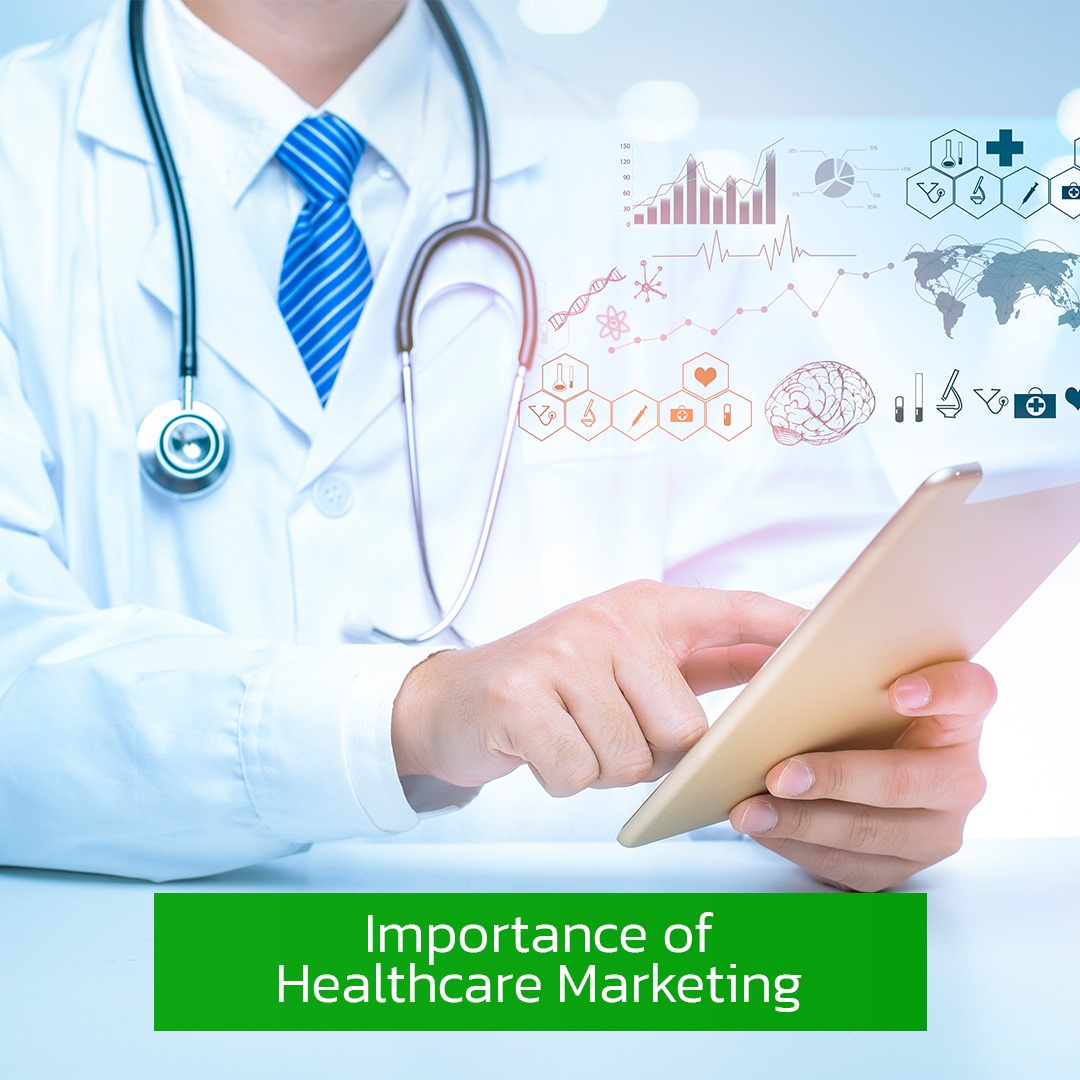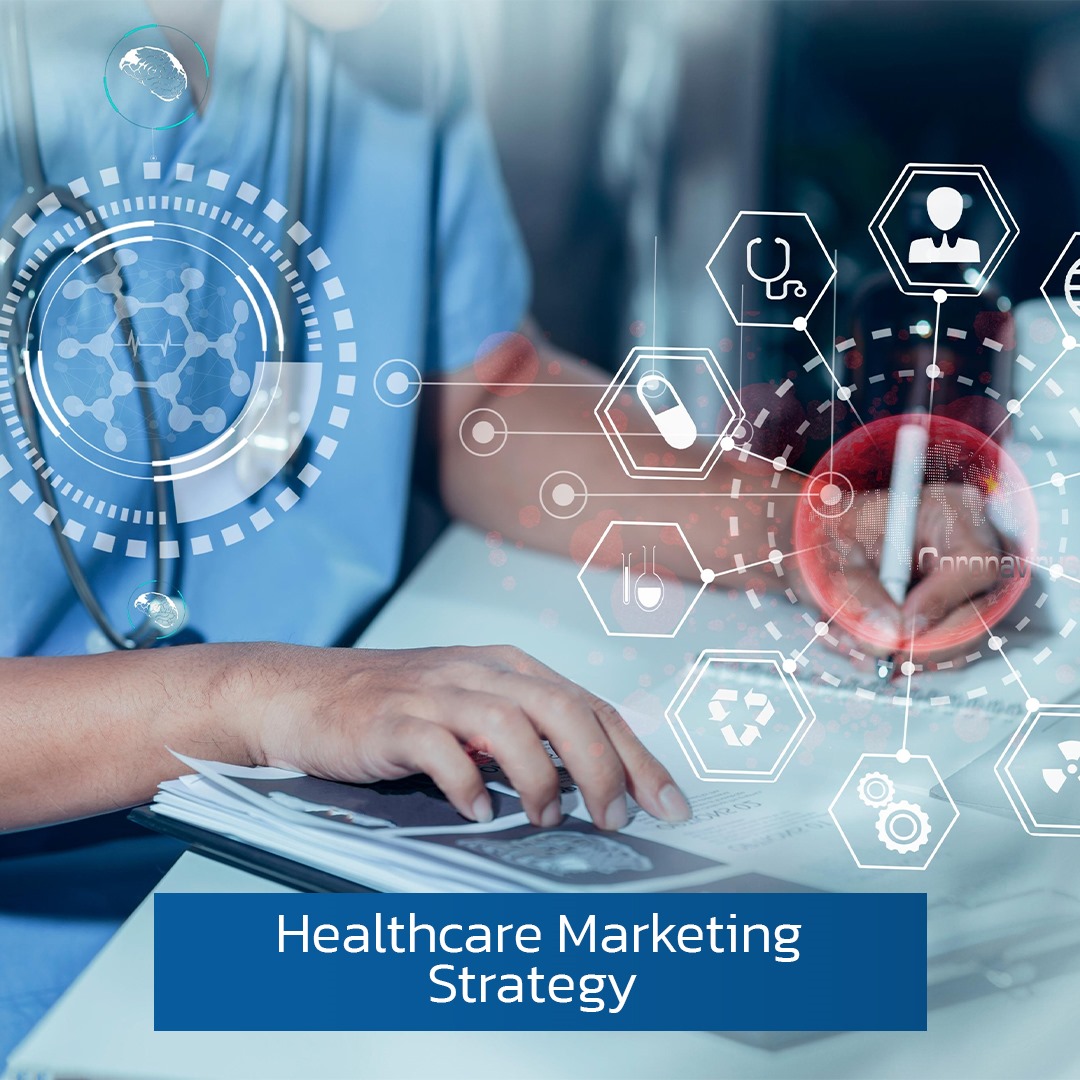

Unlocking the Potential of Healthcare Marketing: A Comprehensive Guide towards Digital Revolution in Healthcare Marketing
Healthcare Marketing is the strategic process of promoting healthcare services, facilities, professionals, and related organizations to effectively connect with patients, build trust, and communicate the unique value of healthcare offerings. It involves a range of marketing strategies, both online and offline, to reach target audiences and fulfill the healthcare needs of communities while adhering to ethical standards and regulations. The goal of healthcare marketing is to inform, engage, and ultimately improve healthcare outcomes for patients and the healthcare community as a whole.
Understand the Healthcare Marketing Market - Global Statistics
-Digital Dominance
The digital realm has revolutionized healthcare marketing. In 2019, approximately 77% of patients used search engines prior to booking an appointment, highlighting the significance of online presence.
-Social Media Impact
Social media is a game-changer. Over 40% of consumers say that information found via social media affects how they deal with their health, illustrating the power of social platforms in healthcare marketing.
-Patient Reviews
Online reviews hold significant sway. Nearly 84% of patients consider online reviews as trustworthy as personal recommendations when choosing a healthcare provider.
-Mobile Accessibility
With the rise in mobile device usage, healthcare marketing strategies must be mobile-friendly. In 2020, 61% of users booked appointments via mobile, underlining the need for mobile optimization.
-Global Expansion
Healthcare marketing is a global phenomenon. Globally, it’s estimated to be a $150 billion industry, reflecting its widespread importance.
-Patient-Centered Approach
Successful healthcare marketing strategies revolve around patient-centric content. Around 66% of patients prefer sharing health information with physicians online before an in-person appointment.
-Data-Driven Decisions
Data analytics and performance measurement are integral. In 2020, the global healthcare analytics market was valued at $17.4 billion, underscoring the reliance on data for effective healthcare marketing.
Benefits of Healthcare Marketing
-Finding Potential Patients with Clear Goals
Healthcare marketing helps identify potential patients while keeping important business goals in mind. This might include maintaining a balanced payer mix or expanding high-value service lines. It’s like having a roadmap to attract the right kind of patients who can benefit from your services
-Gaining an Edge in a Competitive Environment
In today’s super-competitive healthcare landscape, healthcare marketing gives you an edge. It helps you stand out and catch the attention of patients. It’s like having a unique calling card in a crowded marketplace.

-Engaging Patients Throughout Their Journey
Healthcare marketing allows you to stay connected with patients at every step of their healthcare journey. You can send them personalized, relevant information at the right times, making them feel cared for and informed.
-Building Long-term Relationships and Loyalty
It’s not just about attracting patients; it’s also about keeping them. Healthcare marketing strategies help in retaining patients for the long term. This builds trust and loyalty within your healthcare community.
-Generating Quality Leads and Boosting Revenue
Effective healthcare marketing doesn’t just attract anyone – it brings in patients who are genuinely interested in your services. This means you’re not just increasing the number of patients; you’re also generating more revenue with good profit margins.
-Connecting through Multiple Channels
Patients are everywhere, and healthcare marketing helps you reach them across various platforms. Whether it’s through social media, email, or traditional methods, you have the tools to connect with your audience wherever they are.
-Data-Driven Decision Making
With healthcare marketing, you can use data analytics to assess what’s working and what’s not. This allows you to fine-tune your strategies and stay productive. It’s like having a compass that shows you the right direction to go.

Importance of Healthcare Marketing in todays Era
In today’s era, where information is readily available, and patients are empowered to make choices, healthcare marketing is not just a choice but a necessity. It’s a means to inform, engage, build trust, and ultimately provide better healthcare services to individuals and communities.
Marketing is crucial for the healthcare industry in today’s era for several compelling reasons
-Competition and Differentiation
The healthcare sector has become highly competitive. Marketing allows healthcare providers to differentiate themselves from others in terms of services, quality, and patient experience.
-Patient Empowerment
Patients are more informed and proactive today. They often research healthcare options online. Effective marketing ensures that your organization’s information is accessible, accurate, and compelling, making it easier for patients to make informed choices.
-Building Trust
Trust is paramount in healthcare. Marketing helps in building trust and credibility. Through transparent and informative content, healthcare providers can establish themselves as reliable sources of healthcare information.
-Engagement and Education
Marketing enables healthcare organizations to engage with their patients and the community. Educational content, webinars, and social media interactions allow for ongoing communication and patient education.
-Patient Experience Enhancement
A focus on patient-centered marketing can improve the overall patient experience. Understanding patient needs and preferences leads to better service and care.
-Community Health and Well-being
Marketing campaigns can promote health awareness and encourage people to lead healthier lives. This not only benefits individuals but also contributes to the well-being of the entire community.
-Efficient Resource Allocation
By analyzing data and using marketing analytics, healthcare organizations can allocate resources more efficiently. This means better budgeting and a higher return on investment.
-Adaptation to Technology
Marketing has adapted to the digital age. Online marketing, social media, and telehealth have become vital channels. Being present in these spaces is essential to reach the modern patient.
-Navigating Regulatory Changes
The healthcare industry faces regulatory changes. Effective marketing can help in communicating these changes to patients and ensuring compliance.
-Staying Competitive and Sustainable
In the evolving landscape of healthcare, those who do not market effectively may be left behind. Marketing helps healthcare organizations remain competitive and sustainable.
Types of Healthcare Marketing

Online Marketing
- Website and SEO optimization for healthcare is fundamental. An optimized website with relevant, high-quality content will improve your online visibility.
- Content marketing for healthcare involves creating informative and engaging content that addresses the questions and concerns of your audience. This positions you as a trusted source of healthcare information.
- Social media marketing in the healthcare industry is a potent tool for engaging with patients and building your online presence. Share informative posts, patient testimonials, and healthcare news.

Offline Marketing
- Traditional marketing methods like brochures, flyers, and local advertising can still be effective in reaching your local community.
- Community outreach and events create opportunities to connect with potential patients and educate the public about healthcare services.
- Developing physician referrals and partnerships can be a powerful strategy to expand your network and patient base.
Healthcare Marketing Strategy
A proper healthcare marketing strategy is very important for any type of healthcare marketing whether is is Hospital Marketing , Doctors Marketing , Clinic Marketing or any healthcare marketing industry. Here is are top 9 Healthcare Marketing Strategy
1.Offer a Smooth Digital Patient Experience
Focus on making the online experience for patients as easy as possible. Ensure that your website and digital platforms are user-friendly, allowing patients to access information and services effortlessly.
2.Establish a Consistent Brand Image
It’s important to create a consistent brand identity across all your communication channels. This helps patients recognize and trust your healthcare organization.

3.Nurture Relationships through Personalization
Engage with patients on a personal level. Tailor your communication to their needs and preferences. Personalization makes patients feel valued and understood.
4.Develop a Strong Website
Your website is often the first point of contact for patients. Make sure it’s informative, user-friendly, and visually appealing. A strong website can leave a lasting impression.
5.Select the Right Marketing Channels
Evaluate the various marketing channels available. Choose the ones that align with your target audience. Whether it’s social media, email, or traditional advertising, go where your patients are.
6.Manage Patient Reviews
Online reviews are influential. Encourage patients to leave positive reviews and respond to negative ones professionally. This can build trust and credibility.
7.Utilize Analytics for Budgeting
Make use of data analytics to determine the effectiveness of your marketing efforts. This helps you allocate your budget more efficiently, focusing on strategies that work.
8.Align Marketing with Organizational Goals
Ensure that your marketing efforts are in sync with the broader objectives of your healthcare organization. This alignment helps in achieving both short-term and long-term goals.
9.Study Your Market: Keep a close eye on your market
Analyze the healthcare landscape, understand your competition, and identify opportunities for growth and improvement.

Healthcare Marketing Tips
Here are some practical healthcare marketing tips to get you started-
- Stay updated on industry trends and patient preferences.
- Embrace digital marketing strategies and the power of social media.
- Focus on patient-centered content and clear, empathetic communication.
- Regularly assess the effectiveness of your marketing efforts and adjust your strategy accordingly.
In the ever-evolving landscape of healthcare, marketing has emerged as a pivotal force. It is not just about attracting patients but fostering trust, engagement, and long-term relationships. Healthcare marketing helps providers navigate a competitive environment and ensures that patients have access to reliable, accurate information.
With the power of data analytics and digital technology, healthcare organizations can personalize their approaches, improve patient experiences, and communicate effectively. This, in turn, promotes health awareness and benefits both individuals and entire communities.
Marketing in healthcare is not merely a choice; it is a necessity. It is the means through which healthcare providers inform, engage, build trust, and ultimately deliver better healthcare services to individuals and society as a whole. As technology and patient empowerment continue to shape the healthcare industry, effective marketing remains the linchpin in connecting, caring for, and healing those in need.
If you are looking for more information on Healthcare Marketing or looking for Expert opinion from Healthcare Marketing Agency then feel free to write to Kaushal Pandey us at Contact@kaushalpandey.com or call us on +91-9004900100
FAQs
What is marketing in health care?
Marketing in healthcare involves the strategic promotion of healthcare services, facilities, professionals, and organizations to reach, engage, and educate patients and the community. It aims to build trust, enhance patient experiences, and ensure that healthcare services are accessible and known to those who need them.
Why is healthcare marketing important?
Healthcare marketing is vital because it helps healthcare organizations connect with patients, build trust, and communicate the value of their services. It is essential in today’s competitive landscape for attracting, retaining, and engaging patients effectively.
What technology is necessary for success in healthcare marketing?
To succeed in healthcare marketing, organizations should leverage technologies like electronic health records (EHRs), patient relationship management (PRM) software, data analytics tools, and digital marketing platforms. These technologies help in reaching and engaging patients efficiently.
What are the challenges to successful healthcare marketing?
Challenges in healthcare marketing include strict regulatory compliance, maintaining patient privacy, managing online reputation and reviews, handling negative feedback, and staying updated with changing patient preferences and technology trends.
How can health systems improve their healthcare marketing strategy?
Health systems can improve their marketing strategy by focusing on patient-centered care, personalization, data-driven decision-making, and embracing digital channels. They should also regularly assess the effectiveness of their marketing efforts and adapt to evolving trends.
Will implementing a marketing automation tool impact the marketing structure?
Yes, implementing a marketing automation tool can impact the marketing structure positively. It can streamline marketing processes, improve efficiency, and provide data-driven insights, allowing marketing teams to make more informed decisions and allocate resources more effectively.
What are the key components of a successful healthcare marketing strategy?
A successful healthcare marketing strategy includes understanding your target audience, using digital marketing channels, offering personalized content, building a strong online presence, monitoring analytics, and staying compliant with regulations.
How can healthcare organizations maintain patient privacy while marketing their services?
Healthcare organizations should follow strict data protection regulations, obtain patient consent, use secure communication channels, and implement strong cybersecurity measures to ensure patient privacy during marketing efforts.
What role does patient feedback and online reviews play in healthcare marketing?
Patient feedback and online reviews are essential in building trust and credibility. Positive reviews can attract more patients, while responding professionally to negative reviews can demonstrate commitment to patient satisfaction.
How can healthcare organizations adapt to changing patient preferences in the digital age?
Healthcare organizations should stay updated with digital trends, use data analytics to understand patient behavior, and adopt patient-centric approaches. Personalization, engaging content, and online accessibility are key factors.
Is there a place for traditional marketing methods in healthcare marketing?
Yes, traditional marketing methods like print materials, community events, and physician referrals can still be effective, especially for reaching certain demographics or local communities.
How can healthcare marketing help in promoting public health and well-being?
Healthcare marketing can be used to raise awareness about health issues, promote preventive care, and encourage healthier lifestyles, contributing to the well-being of the community at large.
What challenges do healthcare organizations face when implementing marketing automation tools?
Challenges include the initial learning curve, integration with existing systems, data security, and ensuring that automation aligns with the organization’s specific goals and patient needs.
How can healthcare organizations measure the success of their marketing efforts?
Success can be measured through key performance indicators (KPIs) such as website traffic, lead generation, patient acquisition, patient satisfaction scores, and return on investment (ROI).
Is there a need for a dedicated marketing team in a healthcare organization?
Having a dedicated marketing team or personnel is often beneficial as they can focus on marketing strategies, data analysis, and staying updated with industry trends. However, the size and structure of the team may vary based on the organization’s needs and scale.
